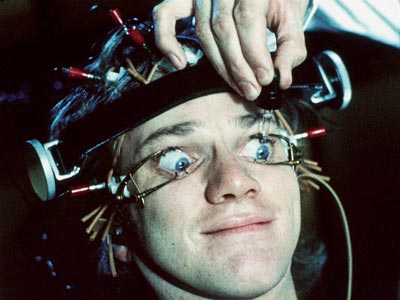“Volunteer” Utilitarians testing Spoil-O-Vision at the Hooded Institute of Technocracy
A Manhattan couple take a taxi to Broadway, where they are set to see the latest whodunnit theater play. As they exit the cab, the driver notes:
“Hey, you haven’t given me a tip!”
“So sue me, asshole,” the man wittily ripostes.
Then the driver leans in, and proclaims:
“THE BUTLER DID IT.”
—old New York joke, and the essence of spoiling
In my recent review of the megaflick Prometheus for this blog, I was bedevilled by the usual pesky need, out of courtesy for the innocent reader, of avoiding “spoilers” — those nuggets of information that can drain away all surprise and suspense from the viewing experience.
When did this obsession with shunning spoilers begin? When Sophocles wrote Oedipus the King, complete with twist ending, his ancient Greek audience was perfectly aware that the sought-for culprit turns out to be the King himself. Didn’t faze them a whit! And children don’t mind at all being told a story to which they already know the end. In fact, they insist on being told their favorites over and over again.
Yet I can’t deny that a spoiler can do just as its name implies, spoil the pleasure of a tale. I still can’t forgive the moronic Newsweek critic who gave away the twist in the film Jacob’s Ladder. Thanks a lot, motor-mouth.
There has to be a way to reconcile the critic’s need to discuss a story and the reader’s expectations of surprise.
In search of a solution, I hied myself off to the forbidding Mt.Berlatsky fortress-like headquarters of the secretive Hooded Institute of Technocracy. There, H.IT.’s semi-deranged genius boffins spent a million man-hours perfecting the answer to my prayers.
The result was Spoil-O-Vision, a technological marvel that is the final coffin for story spoiling!
Your humble servant, Alex, testing Spoil-O-Vision in its beta version.I don’t, I, I do not want to talk about it.
How does it work? Simply drag your mouse’s cursor over the blank space, as you do when you cut ‘n paste text for a plagiarised term paper. Below, for instance, is a spoiler for the aforementioned Jacob’s Ladder:
At the end, we learn that the main character has been dead for years, and the entire movie is his ghost’s delusion of life. A premise ripped off from Ambrose Bierce’s An Occurrence at Owl Creek Bridge, as the Newsweek asshole helpfully pointed out… uh, you HAVE read that Bierce story already, right? No? Oops.
Now I can discuss, say, Agatha Christie’s The Murder of Roger Ackroyd without revealing that
the murderer turns out to be the book’s first-person narrator
And now I can finally disclose those Prometheus spoilers!
Ha! Made you look!!!
At the end of the movie, the surviving crew members penetrate to the heart of the alien citadel of the Engineers, only to find an arena where synthetic life-forms based on characters from ancient Ridley Scott movies fight . Thus darkness from Legend grapples with the Alien, Marcus from Gladiator duels with Feraud from The Duellists, Thelma and Louise trade gunfire with Lucas from American Gangster, while the Blackhawk Down helicopter pursues Deckard in his Blade Runner hovercar. The spectacle is presided over by a 200-year-old Scott, who reveals to the crew that they are also synthezoids, but won’t be needed until the sequel.
But Spoil-o-Vision does have its dark side. Consider the following:
You have just downloaded and activated a copy of the HellHound 3000 virus. If you can read this text, it means your computer has been taken over and your files have been corrupted.
Thank you for having volunteered for this experiment.
Our ..heh, heh…head of research would REALLY like…heh, heh…
to get to know you even better than he already does




Spiffy! My brain is abuzz with the ways this could be done…
that would have really sucked having Jacob’s Ladder spoiled. such a brilliant and distressing film.
Jeet Heer starts his introduction to the Complete Annie vol. 7 with a spoiler warning, which I thought was unusually considerate for the reader. You don’t tend to see that in introductions and forewords, even when they need it most — I’ve learned from bitter experience never to read such things before I’ve read the book. Another dick move: spoilers in explanatory endnotes — my wife’s copy of Moby Dick casually revealed most of the ending, right near the very start of the endnotes.
What really gets my goat, though, are spoilers in back cover blurbs: what the fuck? For instance, Asterios Polyp‘s back cover uses a description only relevant to the final quarter of the book; my copy of Steven Baxter’s Light describes a scene that happens on, literally, the last page of the book. I can’t even read blurbs any more!
Anything which could be spoiled by a spoiler isn’t worth reading.
Holly has a point, lierary or artistic worth shouldn’t, ideally, be based on surprise effects. But we’re really talking about pop genre works here…
My take is that people started getting allergic to spoilers in the 18th century, when serialised fiction first appeared.
A couple of years ago, over at Wikipedia they had this incredibly long and acrimonious debate over whether to in clude spoiler warnings. The final vote was against, quite wisely to my mind.
For a reviewer (as distinct from a critic)it’s a fine line to walk. You don’t want to spoil people’s pleasure in discovering a work, but you do want to be able to discuss the work in full.
It’s so rare that someone creates a truly surprising event in a book or movie that I think it’s kind of a shame to rob someone of the pleasure of being surprised. I don’t see why the surprise effect isn’t part of artistic worth: the best are the ones that you enjoy seeing how they’re constructed upon repeated experiences. But, yeah, a work overall shouldn’t read like Cliffs Notes.
They are tied into genre works, but it’s interesting that one of the most spoiler-obsessed places is Ain’t It Cool News. Those guys want to know everything about the plot before seeing the films. Look at what went on with the Star Wars prequels, for example. Fanboys were bitching about the Midichlorians long before the film.
Vladimir Nabokov’s Invitation to a Beheading is about a prisoner who has been sentenced to death in a world that doesn’t seem real. Will he be executed? Is his world real? If you have the Vintage edition, just look on the back cover to find out.
“Pnin,”also by Nabakov, could be spoiled in a big way.
I think Nabokov himself delighted in spoiling plots for his students at Cornel (and I know that he said, “Books can’t be read, only reread,”). But Jesus Christ, the hero of Invitation to a Beheading spends the entire goddamn book worrying about whether he’s going to die or not, and the answer doesn’t come until the last couple of pages. I would have enjoyed it a lot more if the back cover hadn’t given it away.
————————
holly cita says:
Anything which could be spoiled by a spoiler isn’t worth reading.
————————-
Well, what does “spoiled” mean in this case? Wouldn’t not knowing in advance the way that “Hamlet,” “Romeo and Juliet,” or “King Lear” will turn out add greatly to the experience of the plays, in a way moderns can’t imagine?
Knowing the ending won’t utterly destroy a worthy work’s aesthetic effects, but it can certainly diminish some of them.
————————-
AB says:
For a reviewer (as distinct from a critic)it’s a fine line to walk. You don’t want to spoil people’s pleasure in discovering a work, but you do want to be able to discuss the work in full.
————————–
But isn’t a reviewer (as I always called myself when I was doing book and comics critiques) particularly in the business of recommending or warning against current works for folks who might be interested in the work in question?
And giving away the entire plot thereby spoils much of the experience for their readers. (I made sure to avoid reading about “Prometheus” until seeing the movie…)
————————–
Charles Reece says:
…I don’t see why the surprise effect isn’t part of artistic worth…
————————-
I certainly is, in many works. In some, if not so much “surprise,” there is concern over the way things might go for characters, if Hamlet will make the right decisions, etc.
To experience events and the characters’ fates unfolding as the author intended them to is the correct way to enjoy a work of art. Anyone who peeks at the end is an immature jerk, emblematic of this instant-gratification era.
—————————
They are tied into genre works, but it’s interesting that one of the most spoiler-obsessed places is Ain’t It Cool News. Those guys want to know everything about the plot before seeing the films. Look at what went on with the Star Wars prequels, for example. Fanboys were bitching about the Midichlorians long before the film.
—————————
I’m reminded of the spoiled, greedy little fucks who shake the packages under the Christmas tree because they just can’t WAIT to find out what they’re getting. (No, I never did that; why ruin the surprise?)
Shakespeare borrowed lots of his plots from other sources; I’m pretty many of the people who saw the plays in his own time probably knew how they were going to turn out.
Holly, that’s true only if you have a strong notion of “spoiling” — as in, something like “ruining to the point that it’s much less worth reading/watching”. But you can “spoil” works in a weaker sense, too. My wife would rather have not known what happened to the crew of the Pequod, but Moby-Dick is still worth reading, I guess. I don’t know, maybe not if you’re not interested in whaling lore.
Personally, I try very hard to know as little as possible before seeing a film/reading a comic/reading a book. It’s much more interesting to me when I don’t have any specific expectations, even about what genre it is; one of the reasons it’s fun to watch a genuinely foreign film is that I have no idea who the protagonists or important characters are until the film itself reveals them, since I don’t know who’s a “star” and who isn’t.
I’m with Charles: it’s churlish to declare that a creator’s play with audience expectations has no genuine aesthetic merit. Sez who?
I find the rage against spoiling oppressive at times, because mostly when I want to write about something, I want to write about all of it, and endings are important.
I can understand people not wanting to know, I suppose; surprise seems as worthwhile an aesthetic effect as any other. I just don’t feel like it’s my job as a writer to protect either the audience or the writer. Which is why HU’s a bad place to go if you want to stay spoiler free, I guess….
Mike, Spoiled means ruined doesn’t it? So what my pun means is if something is ruined by a spoiler, it didn’t have much going for it.
Noah, that’s totally reasonable. I think readers are entitled to feel miffed about spoilage when
(a) a review spoils important details that occur in later parts of the work. Some people read reviews of things they’ve already read/seen (I do!), but some people also read reviews of things they haven’t. We should be nice to the latter people.
(b) a piece reveals such details about a different work from the one(s) a reader would reasonably expect to be discussed. If you’re writing about (say) Wonder Woman, it would be dickish to then start talking about the ending of (say) Lint or “The Love Bunglers”, without some kind of spoiler warning.
It’s really about what readers can reasonably expect, and obviously there are different norms depending on the writer and the format.
—————————-
holly cita says:
Mike, Spoiled means ruined doesn’t it? So what my pun means is if something is ruined by a spoiler, it didn’t have much going for it.
—————————–
My first reaction upon reading your earlier “Anything which could be spoiled by a spoiler isn’t worth reading” comment was massive irritation. Wrote a line in response, later deleted, calling it “yet another pithy epigram that, upon a moment’s consideration, is revealed as utter nonsense.”
Then decided I was being too harsh; surely you didn’t mean to be so sweepingly dismissive. To say a work was totally ruined, all its aesthetic effects turned to mud by the giving away of crucial plot points, the dénouement.
Alas, as usual, whenever I think I’m wrong…I’m wrong.
——————————
Noah Berlatsky says:
I find the rage against spoiling oppressive at times, because mostly when I want to write about something, I want to write about all of it, and endings are important.
——————————
How about having consideration for others? “I want to play loud music whatever time of day or night I feel like. I find anti-noise regulations oppressive. I want to talk on my cell phone any time or place I feel like it…”
Certainly, if an ending makes nonsense of all that has gone before, or a plot twist is manifestly absurd, a critic would be mightily handicapped by not wanting to give those away. At least put a line in the start warning of spoilers, though.
I’ve read critiques of new literary works where the critic synopsized the entire plot. Leaving me with he let-down feeling, why bother to read the novel, then? The pleasures of sparkling prose are not enough…
——————————-
Shakespeare borrowed lots of his plots from other sources; I’m pretty many of the people who saw the plays in his own time probably knew how they were going to turn out.
———————————
More accurately, what percentage of the audience of his time was widely-educated enough, or had the access to the massive amount of information that we moderns take for granted, to be aware of the antecedents to his plots?
See http://internetshakespeare.uvic.ca/Library/SLT/stage/audience/audience.html , http://www.shakespeare-online.com/essays/shakespeareaudience.html .
And Shakespeare made sure to include bits in his plays that would be appreciated by all the segments of his audiences, whether lowbrows or literati.
Did he not also structure suspense in his plots, that audiences would be on tenterhooks as to whether Juliet’s plant to fake her death that she may be reunited later with Romeo; aghast how “The messenger [informing him of the plan], however, does not reach Romeo and, instead, Romeo learns of Juliet’s apparent death from his servant Balthasar”? ( http://en.wikipedia.org/wiki/Romeo_and_Juliet#Synopsis )
Therefore, would not the Bard have been thoroughly pissed if some critic had widely disseminated how it would all turn out, before most had seen the play?
Mike, I’m pretty sure everyone would have know how Marlowe’s Faust ended, for example. I bet many of Shakespeare’s stories were fairly well known, too. Besides…in the tragedies, everyone dies, in the comedies, everyone gets married. I don’t know…I just don’t think surprise twists were necessarily a big thing for him.
And consideration for readers…I think one shows consideration by writing as well as you can, not by pretending you don’t know what you know. Though I’m not above giving a spoiler warning here and there, depending on the situation….
By the way, as to how the Spoil-o-Vision works…easy as pie. WordPress allows you to select the color of your type. You just choose white as your color, so you get white-on-white.
Another thing I hate: movie trailers that tell you the whole goddam movie. I remember how irritated I was at the trailer for ‘The Rocketeer’. I just thought, Why do I have to see this flick now?
You didn’t have to see The Rocketeer before you saw the trailer either…
I’m not usually concerned with spoilers, you come to expect them when reading about narratives. One thing that has bothered me recently is the frontmatter in Fantagraphics’ Wandering Son volumes. The little “catching up/who are the characters” text includes spoils for the volume you are about to read. It is sooo weird. Really confused me in v.2 as I didn’t think I was forgetting that much from v.1 and it turns out I hadn’t!